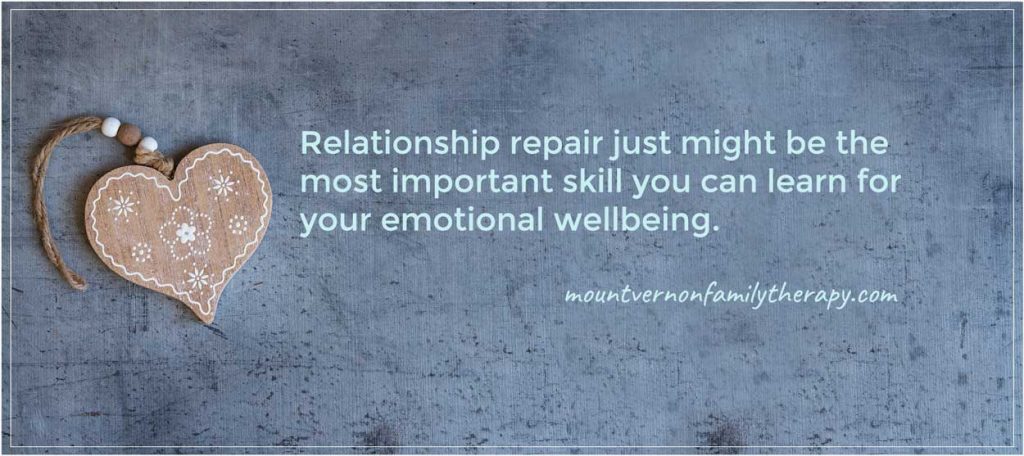Ok, so you messed up. You forgot your husband’s birthday, or you didn’t stop by the store for your girlfriend like you promised. You insulted the annoying buddy from work, or sulked when your boyfriend went out with the guys instead of doing something with you.
Partners hurt each other without meaning to. Whether you can repair hurts successfully may well decide whether your relationship stays stable and happy, or fails.
One of the worst things you can do is ignore upset emotions. When something is bothering either of you, you need to address it. Negative emotions don’t necessarily damage a relationship. But denying them could.
How you tend to handle conflict can predict whether your relationship will stay stable or risk falling apart. Dr. John Gottman’s renown “magic ratio” of 5:1 gives us clear numbers to work with. During conflict, couples who offer at least 5 feel-good gestures for every one negative remark or act tend to rebound and stay happy. Those who make fewer soothing bids are much more likely to divorce — when this ratio persists over time.
We’re human. We do impatient or mindless things sometimes. But we can also change behavior patterns that doesn’t serve us well.
Relationship repair just might be the most important skill you can learn for your wellbeing. Repairs work — even if the attempt itself is imperfect and clumsy.
Relationship Repair Puts You On Course for a Happier Life Together
Making repairs is essential to a long and happy relationship.
“In a great relationships, people try to meet one another’s needs,” explains relationship expert Dr. John Gottman. “They adopt the motto, ‘when you’re hurting, baby, the world stops and I listen.’”
Each partner will miss a need at some point. This hurts. So, the first need is listening to your partner. Then fix the issue. Process your emotions together until each of you feels understood. That’s relationship repair. (This checklist of relationship repair phrases can help too.)
Growing old and happy together is like shooting a rocket to the moon. If your trajectory is a little off, and you don’t correct it, over time the rocket veers farther and farther off course.
You need little corrections for small hurt feelings. You’ll need bigger corrections for bigger ruptures that have left your partner feeling betrayed or abandoned.
How to Talk About What Went Wrong
What goes into an effective apology?
First, listen as openly as you can. Acknowledge your partner’s hurt and anger. Validate how it makes sense to you. For example:
“So I went out with the boys, my cell battery ran out, and you couldn’t reach me. And when the baby got sick and you were scared, that was really hard. I can see how you felt left alone without help, with our baby running a fever.”
Then put your own feelings into words; say how your partner’s experience affects you.
“It makes me feel awful that I wasn’t there for you when you were upset.”
This a great time for your genuine empathy and concern to shine through.
Then, share your intentions for the future:
“I want us to be partners as parents, always. What would help when I’m at work or away, and you need something?”
Offer a Helpful Explanation Without Getting Defensive
Sometimes it’s helpful to explain what was happening with you that contributed to the mishap. This isn’t to deflect blame or make excuses. You explain in order to be more predictable and therefore more dependable for your partner.
For instance, to continue our example:
“Last night I was about to plug in my phone when the dog started barking, and I got distracted and forgot. I was in a rush when I left, and didn’t realize it wasn’t charged. I’m so sorry it scared you that I was out of touch, and left you feeling like I didn’t care.”
It’s important to say what happened only after your partner feels completely understood first.
What To Do About Really Serious Mistakes
What about the bigger injuries – the ones that really rock the foundation of your partner’s faith in being important to you, safe with you, known by you?
When the hurt in your relationship is serious, you may want a therapist trained in helping couples past the really tough spots. The injured partner will need room to share in great detail and with core feeling, the sense of betrayal, loss or abandonment. It will likely be very hard for the other partner to hear without becoming defensive.
A good therapist will help you both face and talk about those deep hurt feelings with each other. The way to regain safety and connection is for the injured person to feel heard, understood, and confident that the hurt is of great concern to their partner.
For instance, after an emotional or physical affair, the injured person may need to revisit different moments of anger, hurt and betrayal many times before feeling sure their partner “gets it” and won’t repeat the affair.
Apologies Enable Stronger Bonds to Grow
Helpful apologies make the bonds stronger. They help us re-experience that we really matter to our mates. Everybody needs a second chance, a time to repair something or do something over. We need to know our partner can have compassion for our blind spots, natural selfishness, and insensitivity. We need to know that our partner has our back.
About Mount Vernon Family Therapy, Alexandria VA
We help you understand distress and how to empower yourself and your loved ones to offer support. Couples can benefit from our special training in Sue Johnson’s Emotionally Focused Therapy (EFT). Work with us to learn safe ways to open up and feel more connected, better understood and happier together. Call us for Couples, Individual and Family Therapy in Alexandria, Virginia.



